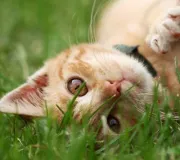Your new guinea pig George is angling to be the perfect pocket pet. This friendly oversized rodent and his relatives are generally non-aggressive animals who hardly ever scratch or bite. Your furry charmer will get along well with your family, although he’d prefer living with his fellow guinea pigs in a spacious enclosure. To increase George’s odds for a healthy life, your Treasure Coast vet will give your pet a complete physical exam, plus diet and care recommendations.
Spacious, Well-Appointed Apartment
George desires a roomy, nicely ventilated enclosure made of sturdy plastic, metal, or wire. Don’t cover the cage top, since your pet is too happy to try an escape attempt. Choose a solid floor, as that will eliminate leg and foot injury risks from a wire mesh bottom. Your poop cleanup duties will also take considerably less time. Finally, give your guinea pig lots of hygienic bedding made from recycled paper litter or shredded newspaper. Change your fastidious pet’s bedding daily.
Climate-Controlled Setting
George wants to avoid overheating from excessive sun exposure. Honor your pet’s wishes by placing his enclosure away from direct sunlight, baking heat, and humidity. If you don’t, he’ll risk dangerous heat stroke. Keep your furry companion in a room with reliable 65 to 79 degree temperatures.
Appealing, Nutritious Diet
Guinea pig pellets generally comprise an acceptable diet base. Your pet also desires tasty leafy greens and vegetables. Give him plenty of variety, and ask the vet about vitamin supplements.
Every morning, blend the kibbles and veggies in a freshly washed, heavy ceramic bowl. Provide your pet with plenty of clean water daily. By attaching a sipper water bottle to his cage, he won’t soil his water with feces or bedding.
Diverse Playtime Options
George has some desirable cage exercise equipment, although he’d also like to play with you in a safe enclosed area. Plan a play zone with easy-to-clean tiled, wooden, or linoleum flooring. Ensure that the playground is free of dangerous electrical wires and outlets, along with chewable baseboards.
George will see your Treasure Coast vet for an annual physical exam, fecal test, and blood work. The vet will watch for dental issues, common among guinea pigs. With top-notch care, and regular vet visits, your pocket pet will enjoy a healthy lifestyle. To receive care for your pocket pet, call us for an appointment.
Our Advice on Providing Quality Guinea Pig Care in 2024
What are ideal housing conditions for a guinea pig?
Ideal housing for a guinea pig includes a spacious, well-ventilated enclosure with a solid floor to prevent leg injuries, avoiding wire mesh bottoms. The habitat should be out of direct sunlight and in a climate-controlled environment with temperatures maintained between 65 to 79 degrees Fahrenheit to prevent heat stroke. Use hygienic bedding, such as recycled paper litter or shredded newspaper, and change it daily to ensure cleanliness. Providing a large enough space is crucial for their well-being, along with access to clean water and a diet of pellets, leafy greens, and vegetables.
What is a basic healthy diet for a guinea pig?
A basic healthy diet for a guinea pig includes a foundation of high-quality guinea pig pellets, which provide essential nutrients. Supplement this with a variety of fresh, leafy greens and vegetables to ensure a balanced intake of vitamins and minerals. Crucially, guinea pigs require a daily source of vitamin C, either through their diet or supplements, as they cannot synthesize it themselves. Fresh, clean water must be available at all times, ideally through a sipper bottle to keep the water clean and uncontaminated.
What specific vegetables and leafy greens are safe for guinea pigs?
For guinea pigs, safe vegetables and leafy greens include romaine lettuce, kale, bell peppers (especially red for their high vitamin C content), carrots (in moderation due to sugar content), cucumber, and broccoli. Spinach can be offered occasionally, but its high calcium content means it should be given in limited quantities to avoid health issues. Always introduce new foods gradually to prevent digestive upset, and ensure all produce is fresh and thoroughly washed to remove pesticides or contaminants. These should be part of a balanced diet alongside quality pellets and fresh hay.
What are signs of illness in guinea pigs that you should watch for?
Signs of illness in guinea pigs include lethargy, loss of appetite, weight loss, difficulty breathing, discharge from the eyes or nose, hair loss, crusty or irritated skin, diarrhea, or changes in behavior such as increased aggression or hiding. Additionally, overgrown teeth or nails, as well as any lumps or bumps, should be examined by a veterinarian. If you notice any of these symptoms, it’s crucial to seek veterinary care promptly to ensure the health and well-being of your guinea pig. For expert care for your guinea pig, visit our veterinary clinic in Treasure Coast, FL.
Are guinea pigs social, and is it important to have more than one?
Guinea pigs are social animals that thrive in the company of their own kind. While they can bond with humans, they require companionship from other guinea pigs for their mental and emotional well-being. Having more than one guinea pig allows them to engage in natural behaviors like grooming, playing, and communicating. Solitary guinea pigs may experience loneliness and stress, which can lead to behavioral and health issues. Therefore, it’s highly recommended to keep guinea pigs in pairs or small groups to ensure they lead happy and fulfilling lives.
Contact us, your local animal clinic in St. Lucie County, FL!


Leave a Reply
You must be logged in to post a comment.